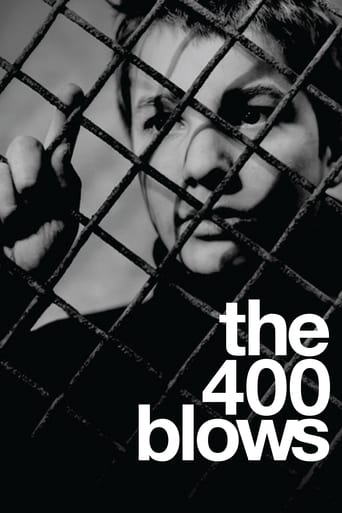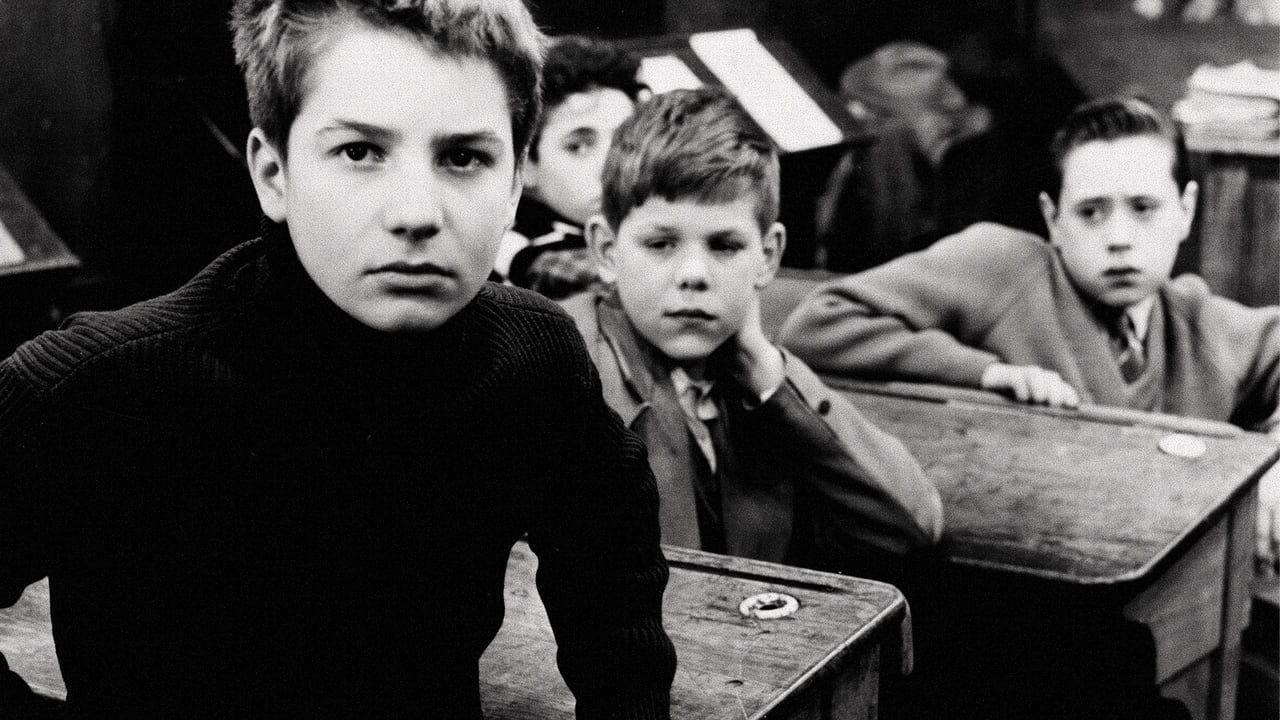cinemajesty
Film Review: "Les quatre cents coupes" (1959) - Giving an initial screening at the 12th edition of Cannes Film Festival, Director François Truffaut (1932-1984) presents his feature debut to non-surprising critical acclaim due to the daring camera movements on a low-budget independent production, also solely helmed by the director, who from the start reveals himself as a dreamer of the unreal to such an extent that leading character Antoine, perfectly cast by Jean-Pierre Léaud as Truffaut's alter ego as a 12-year-old. The love for cinema becomes evident in any scene of picture. Further a deep understanding of the sensual transcendence of picture and sound in motion picture, making the character of Antoine a undeniable identifiable cinematic figure with constant struggle of finding a place to indulge life itself, which gets fulminate concluded in runaway scene of misunderstandings by parents, teachers, governmental authorities and teenager at school all-round, which stroke the nerve of any spectator, who gets immediately thrown into his own past as a child; a circumstance any living human being has in-common. The power of origins are penetrated by DNA, which cannot be reverted, letting François Truffaut become the filmmaking story-teller, sharer of emotions that found his fulfillment in the interviews, conducted in 1966, with Thriller director Alfred Hitchcock (1899-1980), exposed an exchange of thoughts on Cinema, which solved the necessities of any motion picture of any genre produced to impact an audience with human emotion; an all-time must-see from the 1950s.© 2017 Felix Alexander Dausend (Cinemajesty Entertainments LLC)
ElMaruecan82
In the 50's, François Truffaut worked as a critic with a rather defiant and resentful attitude toward traditional "popular" filmmaking. Yet even old-school directors like Cocteau or Clouzot said they never experienced such intensity on the big screen after they saw "The 400 Blows". Truffaut dared to challenge reciprocity and got unanimous praises from his peers and beyond, acknowledging the historical magnitude of the film, maybe the French "Citizen Kane".I guess there's just something about movies made by young directors; Truffaut was only one year older than Welles when he made his directorial debut, young enough to remember the most ungrateful part of boys' lives when they are old enough to take it seriously but too young to be taken seriously. Truffaut embraced the innate freedom of his age and never regarded childhood with nostalgic eyes, deeming it as a period of entrapment and submission to the rules of adults. Interestingly, Truffaut adopted the same rebellious approach to film-making, rejecting cinematic conventions of a plot, protagonists and villains for something that would tunnel the viewers into the truth of life rather than providing an escape from it.The French New Wave was a tsunami of creation that changed the face of cinema. Just like Jean-Luc Godard with "Breathless", a new generation of film-makers would explore cinema as a form of expression prone to improvisation, a freedom of tone, anything but codified tropes, it was Godard who said that the best way to criticize a film is to make one, that's to their credit. But unlike Godard, I doubt Truffaut made this film for the sake of challenging conventions or to make something "pivotal". And for one thing, I happen to share Jean-Pierre Melville's feeling that the New Wave had a huge influence on American Cinema, but the auteur thing was a bit overplayed in France, and the magic was lost in the 60's.So I'm not interested in 'auteur' Truffaut but 'rebel' Truffaut, his youth was exactly the same as his counterpart in the film Antoine Doinel: school troubles, delinquency, absent parents etc. Cinema wasn't just a vocation; it was a survival move, an escape from the path that was awaiting him, a rebellion within the rebellion. There's something in Doinel that reminded me of "Cool Hand Luke", a propensity for 'leaving', the classroom, the place, it's not just rebellion, but like the title suggests: "raising hell", which is the real meaning of "400 blows" but the word "blows" might render the idea that the kid is going to take many hits in his life, which is actually less misleading than the French title, sounding more like childish fun.And Antoine Doinel takes the hits and keeps moving forward, it's not "Rocky" though, Doinel has no specific goal, he lives from day to day, he doesn't think of the consequences, which is the essence of youth ennui. "The 400 Blows" happens to be an immersive character study in the life of a boy who's abandoned by his parents, his mother spending many extra-hours with her boss, and her father who's not the brutal type, has given him a name and a roof, but not what Antoine truly needed: a guidance, a meaning, anything. Antoine comes home eats, takes the trash down and goes to sleep. And the awful state of the house plays almost as an alibi for Doinel's mischievousness.But Truffaut's directing never needs to be intrusive to make us root for Antoine. We just see his background and get it. It is very fitting that, of all the "Simpsons" characters, it was Nelson Muntz who paid tribute to the movie as he was a character whose sordid background was unveiled in the later seasons and is perhaps the closest to Doinel. Doinel isn't even a bully though, and at the first scene, he's the unlucky kid who picks up the sexy calendar just when the teacher raises his eyes. The tragedy of Doinel is that before taking the path leading to delinquency and (who knows) crime, he's just a kid who doesn't care enough about his life to contemplate the idea of becoming a bad boy.The only escapism he finds is with his friend (Pierre Auffray), a fun moment at a zoetrope (a wink to "Strangers on a Train" and Truffaut's idol Hitchcock) and movie theaters, were Doinel drops the picture of Harriet Andersen from Bergman's "Monica", cinema was an escapism for Truffaut as well and the builder of his dreams. The film is a slow escalation to the point where the parents finally give up and put Doinel in a detention center less out of anger than disillusion, because he would escape anyway. Once again, Truffaut never shows the parents as the bad guys, even the kid doesn't blame them, yet we know he's hurt, deeply.Truffaut loved Doinel but was so worried he would grow up during the making, Leaud's answer was that both he and Truffaut had sickly souls, they would never grow up. Truffaut loved the answer and it sealed their collaboration, I wasn't a bit surprised that some scenes involving Leaud were improvised, this is not the improvisation for-the-sake-of-it like Godard would use to show off his revolutionary talent, it's improvisation to capture the truth of the moment, and this is perhaps the best compliment I can give the film, it is truthful, and that final shot is the perfect culmination of a story where you dare to dream of a happy ending but the word "Fin" seems like bars of a prison entrapping poor Antoine.The film is dedicated to Andre Bazin, a former critic, co-founder of Cahiers du Cinema who died in 1958. "The 400 Blows" is the pivotal encounter between a message, a feeling and a young talent, at the right time and the right place. To label it as New Wave starter is too reducing, especially since the film is deeper and more penetrative than Godard's "Breathless".
Georgi Dianov Georgiev
What a dreadful disenchantment! What a shame of life! What a pity of parents! Sorry boy, it is not your entire fault: your school mates also want to run away from those 'chaotic' kind of teachers and miserable classroom. You are not the only one willing to do it, although your brightness looks like missing from your head-box and it is probably in your 'bollocks'. The educated ones once said: "the apple does not fall far from the tree", so Antoine darling, do not expect too much from this life, because it was your mother who drew your path since she gave you birth. What is more, did not you see her kissing that disgusting guy whilst crossing the pedestrian crossing? She does not give you money, she is not even interested in what you are studying at school... What kind of mother is that!? Yes, but do not forget to throw the garbage away...Ah, right, I understand. Only when you missed things up she comes to you and says "if you do this, I will give you that". Oh, come on! But even so, after all your 'minor effort' in Honoré de Balzac to get better marks, here comes the other nuts scatterbrained tutor and throws away all your effort. Even I would not make any effort to study in that case.However, remember that you have a treasure, which name is 'René'. Such a lovely friend, always helping and giving the most accurate advice. What a bad luck at the end, though, when he could not visit his friend Antoine, after a long journey with the bicycle. But, at any rate, Antoine is a good kid. When he has to take away the garbage he does it. When he has to study, he also does it. Even when his tutor tells him off and orders him to clean or do anything, he is listening! Let us not forget that after stealing the typewriter, it was him who decided to go back and leave it from where he took it, and it was not his Chicken-René-friend. I truly believe that François Truffaut wanted to show us the 'lack of child guidance' combined with the unhappy home life, Antoine's mistakes and his behavior towards the consequences. This movie reminded me of both Billy Elliot and Forrest Gump, given the fact that all characters are running towards desperate destinations, in a crucial time of their lives. I enjoyed the movie and the French expressions, but I disagree that this movie is better than Ben-Hur (1959) or Strangers on a Train (1951).
onursumer_94
"400 Blows"... uh... how can I start? I've begun french movies with this masterpiece. It is the best french movie in my opinion and my second favorite movie. The director, Francois Truffaut reflects Antoine Doinel's life as a real experience. He actually shows his troubled childhood in the "400 Blows" and this makes the movie the first example of French new wave movies. I felt while watching that when Antoine walked, I walked. When he ran, I ran. I experienced his life as mine. This is one of the most important feature of French new wave movies (Nouvelle Vague) , so life can be seen more real in these type of films. That's because I feel real emotions and sorrows. That's because I adore this movie, and Truffaut himself. Antoine Doinel feels distress because of his family and society around him. He can't show himself up at school or in life. He lives with lies and a bad family. Everything around him is shattered and drags him to do forbidden things like committing a theft. These troubles make him escape from his wicked life. In the final scene, we can see that he runs without a backward glance. Some people cannot understand why Truffaut finishes this movie like this and why Antoine runs. Trying to get over his life is the explanation of it and Antoine's inevitability is the final moment. The sea represents he cannot get over from his life. The expression on his face is the symbol of desperation. "400 Blows" will remain in my favorites in short. Every human being should see this.



 AD
AD








